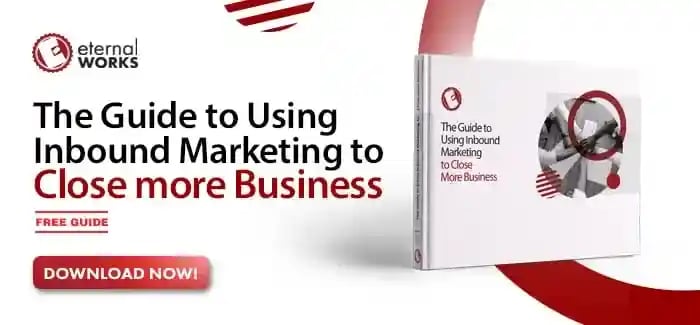It's a common scenario: You've tried everything from outbound cold-calling to buying leads lists, but you're just not seeing the desired return on investment (ROI).
Everyone in business knows generating leads can be challenging. But what if there was a better way to generate leads? A way that didn't involve searching in the dark, hoping that you'd eventually find someone interested in what you have to say?
Well, we have good news: inbound marketing is the answer you've been looking for.
By creating valuable content and making it easy for your ideal customers to find you, inbound marketing generates more qualified leads that are more likely to convert. Keep reading to learn how inbound marketing can give you a better ROI than outbound marketing.
How Does Inbound Marketing Work?
Inbound marketing is about creating valuable content that potential customers want to see. You can use various strategies like creating blog posts, e-books, infographics, or helpful tips and advice. When you provide valuable and relevant information, you can attract new leads and website visitors and eventually convert them into customers.
The key to successful inbound marketing is having a content strategy. This means creating relevant content for your target audience and publishing it at the right time. Timing is everything, as you need to ensure your content is seen by potential customers when they are interested in what you have to say.
Inbound marketing is more effective and efficient than outbound marketing. It allows you to target your ideal customers directly instead of blindly trying to reach as many people as possible.
The Importance of ROI for Your Business
Your ROI, or return on investment, measures how much revenue your marketing efforts generate. Through inbound marketing, you can create brand awareness, long-term partnerships, and business referrals, all of which will help increase your ROI.
Inbound marketing helps you build a strong relationship with your customers. Relationships built on trust and mutual respect last over time. As a result, you get a better ROI because your customers are more likely to continue doing business with you.
When you use inbound marketing, you develop relationships with other businesses in your industry. These relationships can lead to joint ventures, cross-promotions, and other opportunities to generate more revenue.
Business referrals are yet another way inbound marketing can help you increase your ROI. Inbound marketing enables you to create a community of customers and followers who trust and respect your brand. These customers and followers are more likely to refer others to you, leading to more business and revenue.
Why Using Inbound Marketing to Generate ROI Makes Sense
There are several reasons why using inbound marketing to generate ROI makes sense. Here are a few of the most important ones:
inbound is a Cost-Effective Marketing Method
Inbound marketing is not only cost-effective, but it also eliminates the need to spend money on expensive advertising campaigns. Instead of investing in traditional forms of advertising, such as TV commercials or billboards, inbound marketing focuses on creating valuable content that attracts and engages your target audience.
By providing valuable information and resources you can effectively capture the attention of your ideal customers without the high costs associated with traditional advertising. This allows you to allocate your marketing budget more efficiently and maximize your return on investment.
Inbound increases Website Traffic
Inbound marketing increases your website traffic by creating valuable content that people want to see. By consistently producing high-quality blog posts, e-books, infographics, and other content formats, you not only provide potential customers with an easy way to find your website but also establish yourself as an authority in your industry.
When you create engaging and informative content, you attract visitors who are actively searching for information or solutions related to your products or services. These visitors are more likely to spend time on your website, explore other pages, and ultimately convert into leads or customers.
inbound increases Reporting and Analysis Capabilities
Inbound marketing allows you to track your results and analyze your performance in a way that outbound marketing simply cannot. With the right tools and metrics in place, you can gain valuable insights into what is working and what is not, allowing you to make data-driven decisions and adjust your strategy accordingly.
One of the key advantages of inbound marketing is the ability to measure and track the effectiveness of your campaigns. By utilizing analytics tools such as Google Analytics, you can monitor website traffic, engagement metrics, and conversion rates to gain a clear understanding of how your content is performing. This data can then be used to identify areas of improvement and optimize your campaigns for maximum impact.
Inbound nurtures Leads into Customers
It's easy to nurture your leads into customers by providing them with the information they need at each stage of the buyer's journey. Inbound marketing allows you to tailor your content to meet the specific needs and interests of your leads, guiding them through the sales funnel and ultimately converting them into loyal customers.
By nurturing your leads with relevant and targeted content at each stage of their buyer's journey, you not only increase the likelihood of converting them into customers but also build a strong relationship based on trust and value. Inbound marketing allows you to deliver the right content at the right time, ensuring that your leads feel supported and empowered to make a purchase decision.
inbound helps keep content contextual
Inbound marketing requires you to create unique and original content that's contextually relevant for your prospects, which helps you stand out from your competitors. By developing a distinctive voice and offering valuable insights, you can establish yourself as a thought leader in your industry. This not only attracts potential customers but also sets you apart from other businesses vying for their attention.
When you consistently produce unique and original content, you demonstrate your expertise and build credibility with your audience. They come to trust your brand as a reliable source of information and solutions. This reputation gives you a competitive edge, as customers are more likely to choose a company they perceive as knowledgeable and trustworthy.
Overall, creating unique and original content is essential for successful inbound marketing. It helps you stand out from your competitors and establishes your brand as a trusted authority in your industry. By consistently delivering fresh and valuable insights, you can attract and retain customers, ultimately generating a higher return on investment.
inbound helps create a Reputable Position for Brands
By creating quality content and developing relationships with your customers, you create a positive image of your brand. This reputation will not only lead to more business, but it will also attract new customers who are seeking expert advice and solutions.
When you consistently deliver valuable insights and information through your content, you demonstrate your expertise and build credibility with your audience. They come to trust your brand as a reliable source of knowledge and solutions, leading to increased brand loyalty and customer retention.
How to Measure if Inbound Marketing Is Working and Generating ROI
One of the best things about inbound marketing is that it contributes to long-term brand and business development. It attracts customers and prospects through valuable content rather than the traditional approach of interrupting them with advertising messages.
However, you should use the right KPIs to determine if your inbound marketing efforts are working and delivering a return on investment. Some of the KPIs and metrics you can consider include:
- Website traffic growth
- Leads generated
- Lead conversion rate
- Sales revenue
- Customer acquisition costs
- Customer lifetime value
- Net promoter score
These are just a few of the metrics you can use to measure your inbound marketing ROI. If you're unsure which KPIs are most important for your business, talk to a marketing agency experienced in inbound marketing. If you're looking to hire an agency, we can help.
Key Takeaways
Inbound marketing is the secret to unlocking long-term business success and attaining a higher ROI. By creating quality content, you can attract more website visitors, generate more leads, and convert more leads into customers. If you don't know how to get started with inbound marketing, download our guide to using inbound marketing to close more business.



